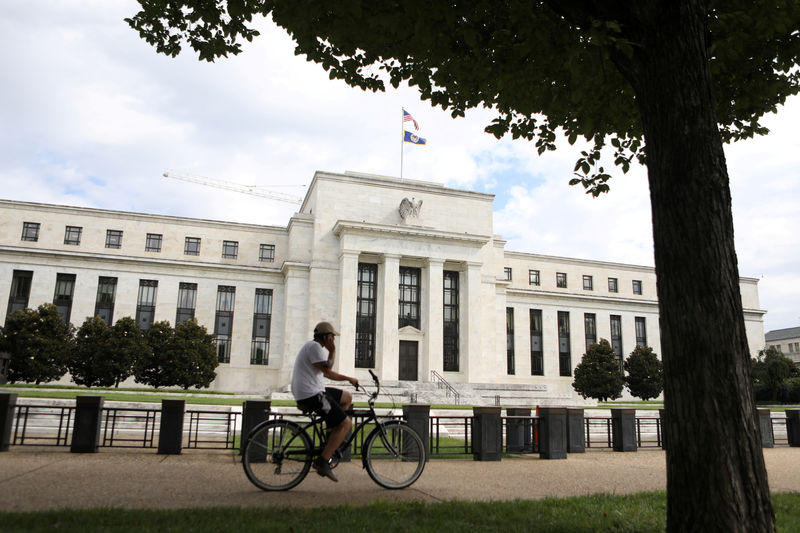(Reuters) - Following are five big themes likely to dominate thinking of investors and traders in the coming week and the Reuters stories related to them.
1/PUT UP, THEN SHUT UP
The Federal Reserve is almost certain to hike U.S. interest rates for the fourth time this year to 2.25-2.50 percent on Wednesday but it will be 'What they say, not what they do' that really matters.
Money markets have swung dramatically in recent months and are now only fully pricing one more hike in 2019 having expected another two or three at least earlier in the year.
The reason for the shift is that the U.S.-China trade war and the Fed's tightening are already taking a toll on growth and on the stock market. With large parts of the U.S. equity market already in in bear-market territory, investors will hope for comforting words from the Fed. Slower -- or no -- rate rises in 2019 would be the perfect early Christmas present.
(Interest Rate Paths Among Major Central Banks: https://tmsnrt.rs/2QThO2g)
2/POUND DOGS
With sterling set for its biggest weekly drop in seven weeks after a tumultuous week in British politics, markets are slowly digesting the possibility that the UK could crash out of the European Union at the end of March without a deal.
Though the majority of analysts think that an iteration of Prime Minister Theresa May's current deal will ultimately be passed by parliament, some investors say signs of stress are emerging in British assets, similar to what was seen during the dark depths of the euro zone crisis.
For example, 90-day correlations between the benchmark UK stock index and the British pound has strengthened in recent days -- normally both these assets move inversely to each other.
The cost of insuring against a UK debt default is at the highest since the 2016 vote and some big banks say a lurch into a 'hard' Brexit where ties are badly severed would hack another 5-10 percent of sterling.
(Correlations: https://tmsnrt.rs/2zZIvZE)
3/SYNC-ING SHIP
It is rare for the Bank of Japan to rock the boat at its policy meetings but the ship Haruhiko Kuroda is steering is so large that even miniscule manoeuvres can cause massive waves. After all, the BOJ's balance sheet has just surpassed the size of the economy, raising questions of how this can ever be unwound.
Speculation of the BOJ's dissatisfaction with elements of its ultra-loose monetary policy, especially the impact on smaller banks, has raised some expectation that bond markets could be allowed to trade in a slightly wider range. The BOJ also owns almost 80 percent of Japan's ETFs which critics say distorts the stock market.
Alas though, any intention to tweak policy towards the tighter side, will have been foiled by the economy's latest developments. Japan is clearly de-syncing with the rest of the world economy -- its economy just shrank the most in four years and export orders are seen contracting at the fastest pace in two years, a consequence of the trade war embroiling its mighty neighbour next door and a peaking electronics supercycle. And inflation is nowhere near target.
Expect Captain Kuroda to maintain a steady course ahead.
(BOJ's buying spree II: https://tmsnrt.rs/2QDgFIG)
4/EMERGING FROM THE GLOOM?
MSCI's emerging currency index is down 25 percent from its January highs but signs of a very modest rebound in recent weeks has provided some hope for next year.
Of course, huge dollar borrowings in EM means the fate of many is still in the hands the Fed and the greenback but local central bankers do have some sway and there are a multitude of rate meetings coming up.
Following another hike from arch hawk Russia on Friday markets reckon more hikes are possible in Indonesia which has upped rates six times already in 2018, the Czech Republic where policy has tightened four times in a row and in Mexico which raised rates in November for the third time to a decade-high.
Thailand may deliver a rise for the first time in seven years and there are also rate-setting meetings in Colombia, Taiwan to watch too. But here's the rub -- expectation is building that the U.S. Fed will pause after one more hike next year. If it does, emerging markets, might find 2019 more relaxing than feared.
(EM central banks: https://tmsnrt.rs/2CTbsIU)
5/BANKING IN A POST-QE WORLD
In less than two weeks the ECB's 2.6 trillion-euro stimulus extraordinaire draws to a close but euro zone share prices, especially for banks, are lower today than in 2015 when the printing presses were switched on. But hope dies last.
Many reckon the very fact that Mario Draghi feels confident enough to end QE is a good sign. Draghi did downgrade growth and inflation forecasts but banks and their investors are clinging to hope that prices might move up enough to justify a rate hike towards end-2019.
They could argue that even after QE ends the ECB will remain in the market to reinvest the proceeds of maturing bonds. What's more, lenders would benefit if it meets expectations of a new round of so-called LTROs, cheap long-term loans to banks.
Another positive is the apparent ceasefire between Italy and Brussels over the former' s 2019 budget. Potentially that allows Italian banks to get on with the business of cleaning up their balance sheets; consequently, the Milan banking index (FTIT8300) was flat this week. Finally, there is nothing like M&A activity to get shareholders excited -- this week's talk of a merger between German behemoths Commerzbank (DE:CBKG) and its troubled peer Deutsche, has sent shares in both spiralling.
(Euro zone markets in the QE era: https://tmsnrt.rs/2Pxb0Th)
